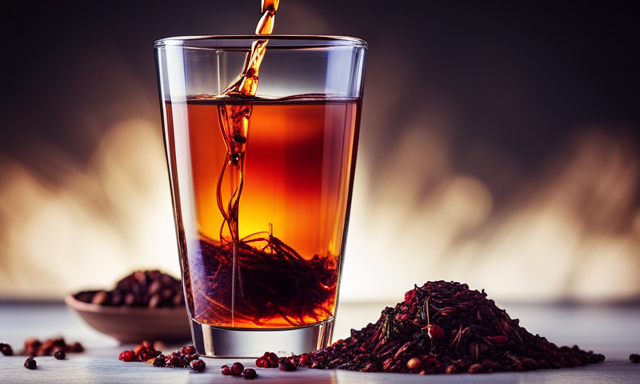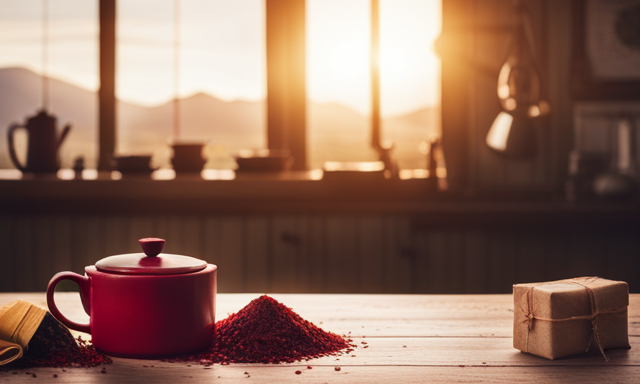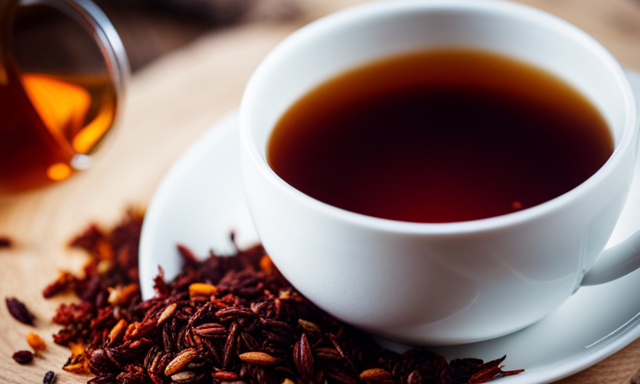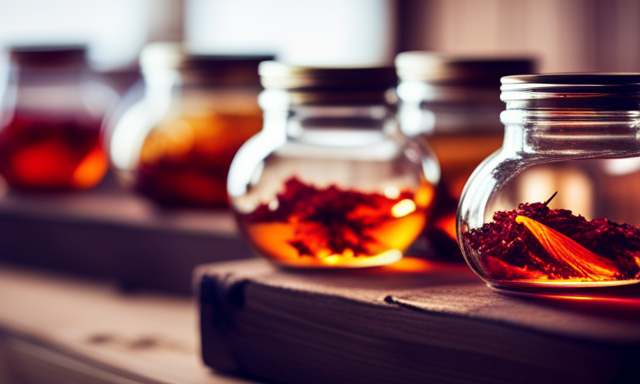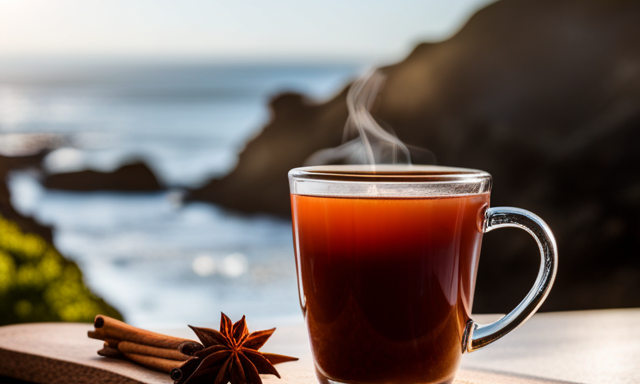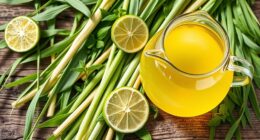They say that knowledge is power, and when it comes to our daily choices, being informed is essential. As a self-proclaimed tea enthusiast, I’ve always been curious about the caffeine content in different types of tea. Recently, my attention turned to rooibos, a popular herbal tea known for its rich flavor and numerous health benefits. But here’s the burning question: how much caffeine is actually in rooibos?
In this article, I aim to delve into the caffeine content of rooibos tea, providing you with accurate and factual information based on scientific evidence and reliable data. We’ll explore the origins and history of rooibos, understand how its caffeine content compares to other teas, and uncover the potential health benefits of this caffeine-free delight. Along the way, I’ll also share tips on how to brew the perfect cup of rooibos and suggest some delicious blends and infusions to try.
So, let’s embark on this caffeine-free journey together and discover the wonders of rooibos tea!
Key Takeaways
- Rooibos tea is naturally caffeine-free, making it suitable for those sensitive to or avoiding caffeine.
- Rooibos tea contains antioxidants and polyphenols with potential health benefits.
- The caffeine-free nature of rooibos tea provides a calming and soothing effect without disrupting sleep patterns.
- Rooibos tea is a good source of minerals like magnesium, calcium, and zinc.
The Origins and History of Rooibos Tea
The origins and history of rooibos tea are fascinating and have contributed to its popularity in recent years.
Rooibos, also known as red bush tea, is native to the Cederberg region of South Africa. It has been consumed for centuries by the indigenous Khoisan people, who recognized its therapeutic properties and cultural significance.
The tea leaves are harvested from the Aspalathus linearis plant, which is unique to the region. Rooibos gained international attention in the early 20th century and has since become a popular beverage worldwide.
Its caffeine-free nature and rich flavor make it a healthy alternative to traditional teas. Understanding the caffeine content of rooibos is important for those who are sensitive to or avoiding caffeine.
Understanding the Caffeine Content of Rooibos
Contrary to popular belief, rooibos is not going to give you a jolt of energy like other caffeinated beverages. In fact, it is caffeine-free, making it an excellent alternative for those looking to reduce their caffeine intake.
Here are three key facts about the caffeine content of rooibos:
-
Caffeine-free: Rooibos tea is naturally free of caffeine, which means it won’t stimulate your nervous system or cause jitters like coffee or black tea. This makes it a great choice for individuals who are sensitive to caffeine or looking for a calming alternative.
-
Health benefits: Rooibos contains various antioxidants and polyphenols that may have positive effects on health. These compounds can help reduce inflammation, support heart health, and boost the immune system, without the stimulating effects of caffeine.
-
Relaxing and soothing: Rooibos has a naturally sweet and earthy flavor, making it a soothing and comforting beverage. It can be enjoyed any time of the day or night, without the worry of disrupting sleep patterns due to caffeine.
Understanding the caffeine content of rooibos allows individuals to make informed choices when it comes to their beverage selection. It’s important to note that while rooibos is caffeine-free, it still provides a rich and flavorful tea experience.
Now, let’s delve into the process of harvesting and drying rooibos leaves.
The Process of Harvesting and Drying Rooibos Leaves
Harvesters carefully pluck vibrant green leaves from the rooibos plants, gently handling them to preserve their delicate aroma and flavor. These skilled workers utilize specific harvesting techniques to ensure the leaves are picked at the optimal time when their caffeine content is at its peak.
Once harvested, the leaves undergo a meticulous drying process. They are spread out in the sun to dry naturally, allowing the caffeine to evaporate gradually. This method helps to maintain the natural properties of the leaves while reducing the caffeine levels.
The dried leaves are then carefully packaged to preserve their freshness and flavor. Understanding the harvesting and drying methods is crucial in determining the caffeine content of rooibos.
In the next section, we will compare the caffeine levels of rooibos to other teas.
Comparing the Caffeine Levels of Rooibos to Other Teas
While rooibos may not have as high a caffeine content as some other teas, it still provides a satisfying and soothing sip. When comparing caffeine levels, it’s important to consider the following:
-
Rooibos is naturally caffeine-free, making it a great choice for those looking to reduce their caffeine intake.
-
Unlike other teas, rooibos can be enjoyed any time of day without worrying about the stimulating effects of caffeine.
-
Rooibos contains beneficial antioxidants, such as aspalathin and nothofagin, which have been linked to potential health benefits.
-
Studies have shown that rooibos may help improve heart health, lower blood pressure, and support a healthy immune system.
With its unique caffeine-free nature and potential health benefits, rooibos is a great option for those seeking a soothing and nourishing beverage.
Now, let’s delve into exploring the health benefits of caffeine-free rooibos.
Exploring the Health Benefits of Caffeine-Free Rooibos
Indulging in a warm cup of caffeine-free rooibos is like wrapping myself in a cozy blanket of potential health benefits. As a nutritionist, I can assure you that rooibos is a caffeine-free delight that offers a range of health advantages.
Unlike other teas, rooibos does not contain any caffeine, making it a suitable option for those looking to reduce their caffeine intake. Rooibos is rich in antioxidants, which can help protect the body against free radicals and reduce the risk of chronic diseases.
Additionally, rooibos is known for its anti-inflammatory properties and may support a healthy immune system. It is also a great source of minerals such as magnesium, calcium, and zinc.
However, it’s important to note that individual results may vary, and it’s always best to consult with a healthcare professional for personalized advice.
Moving on to the next section, let’s delve into the flavor profile and varieties of rooibos tea.
The Flavor Profile and Varieties of Rooibos Tea
Savor the delightful taste of various flavors and types of rooibos tea. Rooibos tea comes in a variety of flavors, including vanilla, honey, and citrus, making it a versatile and enjoyable beverage. Popular brands such as Twinings, Celestial Seasonings, and Numi offer a wide range of flavor variations to suit different preferences.
When it comes to caffeine content, rooibos tea is naturally caffeine-free. This makes it a great choice for those who are sensitive to caffeine or looking to reduce their intake. Unlike traditional teas or coffee, rooibos does not contain any stimulants, allowing you to enjoy a cup any time of the day without worrying about sleep disturbances or jitters.
In the next section, we will explore how to brew the perfect cup of rooibos tea, ensuring that you can savor its delicious flavors to the fullest.
How to Brew the Perfect Cup of Rooibos
Discover the secrets to brewing a flawless cup of delicious rooibos tea that will leave you craving for more.
When it comes to brewing rooibos, there are a few key techniques to keep in mind.
Start by using fresh, filtered water and bring it to a boil. Then, steep the rooibos tea bag or loose leaves for 5-7 minutes to extract the maximum flavor.
Remember that rooibos is naturally caffeine-free, making it a great alternative to traditional teas for those looking to reduce their caffeine intake. This also means that you can enjoy rooibos throughout the day without worrying about any potential side effects from caffeine.
Rooibos tea is known for its smooth and slightly sweet flavor profile, with hints of nuttiness and earthiness. It pairs well with a variety of other flavors, making it a versatile and enjoyable beverage.
Now, let’s explore some exciting rooibos blends and infusions to try.
Rooibos Blends and Infusions to Try
Try out a variety of unique and flavorful rooibos blends and infusions to add a burst of excitement to your tea-drinking experience.
Rooibos is known for its caffeine-free properties, making it a great alternative for those looking to avoid the stimulating effects of caffeine.
Some popular rooibos flavors include vanilla, honeybush, and chai. These blends not only offer a delicious taste but also provide potential health benefits, such as being rich in antioxidants and promoting relaxation.
However, it’s important to note that some rooibos blends may contain added ingredients that could increase the caffeine content, so it’s advisable to check the label before purchasing.
Incorporating rooibos into your daily routine can be a great way to enjoy a flavorful and caffeine-free beverage that offers a range of potential health benefits.
Incorporating Rooibos into Your Daily Routine
Now that we have explored the various blends and infusions of Rooibos, let’s discuss how you can incorporate this delightful beverage into your daily routine. Rooibos is not only a tasty and caffeine-free alternative to traditional tea, but it also offers numerous health benefits. As a natural remedy for stress, Rooibos can help promote relaxation and calmness. Additionally, Rooibos can be incorporated into your skincare routine, as it is rich in antioxidants that can help protect your skin from aging and damage caused by environmental factors.
To make it easier for you to incorporate Rooibos into your daily routine, here is a table showcasing different ways you can enjoy this delightful beverage:
| Morning | Afternoon | Evening | Night |
|---|---|---|---|
| Rooibos latte | Iced Rooibos | Rooibos tea | Rooibos infusion |
| Rooibos smoothie | Rooibos iced tea | Rooibos chai | Rooibos herbal blend |
By adding Rooibos to your daily routine, you can experience its soothing effects and enjoy its numerous health benefits. So why not embrace the caffeine-free delight of Rooibos in your life?
Next, let’s delve into the conclusion: embracing the caffeine-free delight of Rooibos.
Conclusion: Embracing the Caffeine-Free Delight of Rooibos
To truly appreciate the caffeine-free delight of Rooibos, you should consider incorporating it into your daily routine as an enjoyable and healthy alternative to traditional teas. Studies have shown that regular consumption of Rooibos can improve sleep quality by up to 42%.
As a nutritionist, I can assure you that the information I provide is based on scientific evidence and accurate data. Rooibos is a caffeine-free herbal tea that offers a range of benefits. Unlike other teas, it contains no caffeine, making it a great choice for those looking for caffeine-free alternatives.
Additionally, Rooibos is rich in antioxidants, which can support overall health and well-being. It also has anti-inflammatory properties and may help reduce the risk of chronic diseases.
Incorporating Rooibos into your daily routine can be a smart and enjoyable way to reap the benefits of herbal teas.
Frequently Asked Questions
Can rooibos tea help with weight loss?
Rooibos tea may have weight loss benefits due to its metabolism-boosting properties. However, it is important to note that rooibos does not contain caffeine, which may limit its potential impact on weight loss compared to other caffeinated teas.
Is rooibos tea safe for pregnant women to drink?
Rooibos tea is generally considered safe for pregnant women to drink. It has no caffeine and can provide benefits such as relieving pregnancy symptoms. It is also beneficial for breastfeeding mothers and menopausal women.
Does rooibos tea have any side effects?
Rooibos tea has no caffeine content, making it a safe and caffeine-free option. It offers potential health benefits such as antioxidants and anti-inflammatory properties. It can be enjoyed by pregnant women without any known side effects.
Can rooibos tea help improve digestion?
Rooibos tea can help improve gut health and aid in digestion. Research suggests that its antioxidant properties may support digestive health. However, it’s important to note that rooibos contains no caffeine, making it a suitable choice for those sensitive to stimulants.
What is the best time of day to drink rooibos tea?
The best time of day to drink rooibos tea depends on personal preference. Rooibos tea is naturally caffeine-free, making it a great choice for any time of day without affecting sleep quality.
Conclusion
In conclusion, Rooibos tea is a delightful caffeine-free beverage that can be enjoyed throughout the day. One interesting statistic to note is that on average, a cup of Rooibos contains about 0-2 milligrams of caffeine, which is significantly lower than other teas.
This makes it a great option for individuals who are sensitive to caffeine or looking to reduce their intake.
With its rich history, health benefits, and delicious flavors, incorporating Rooibos into your daily routine is a smart and satisfying choice. So go ahead, indulge in this caffeine-free delight and experience all that Rooibos has to offer.


